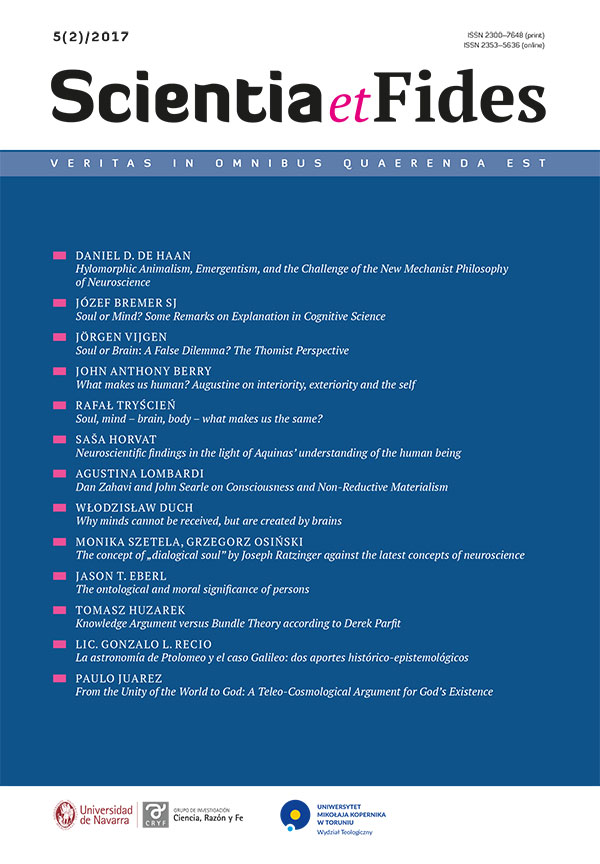Knowledge Argument versus Bundle Theory according to Derek Parfit
Mots-clés
subject, person, identity, qualia, consciousness, self-consciousnessRésumé
According to constitutive reductionism of Derek Parfit, a subject/person is not a separate existing being but his existence consists in the existence of a brain and body, performance of actions, thinking and occurrence of other physical and mental events. The identity of the subject in time comes down only to “Relation R” - mental consistency and/or connectedness – elicited by appropriate reasons. In the following article, I will try, relying on Frank Johnson's Knowledge Argument, to argue in favour of the following conclusions: (1) a person/subject is a “fact”irreducible to body and physical relations with the environment and (2) a subject is something/”fact” non-reducible to mental occurrences.Références
Chalmers, David. Świadomy umysł. Translated by M. Miłkowski. Warszawa: PWN, 2010.
Crick, Francis, and Christof Koch. “Rama teoretyczna dla świadomości.” In Formy aktywności umysłu. Ujęcie kognitywistyczne. Emocje, percepcja, świadomość, vol. 1, Edited by A. Klawiter, 302-323. Warszawa: PWN, 2008.
Frank, Manfred. Świadomość siebie i poznanie siebie. Translated by Z. Zwoliński. Warszawa: Oficyna Wydawnicza, 2008.
Huzarek, Tomasz. “Kłopoty z tożsamością – czyli Dereka Parfita głos w sprawie i nieredukcjonistyczna odpowiedź.” Studia Pelplińskie XLV (2016), 101-116.
Jackson, Frank. “Epiphenomenal Qualia,” The Philosophical Quarterly, 1982 (32), 127-136.
Judycki, Stanisław. “Intuicja i spekulacja,” Roczniki Filozoficzne (52)2004, 2, 227-239.
Judycki, Stanisław. Świadomość i pamięć. Uzasadnienie dualizmu antropologicznego. Lublin: WN KUL, 2004.
Kant, Immanuel. Krytyka czystego rozumu. Translated by R. Ingarden, Kęty: Antyk, 2001.
Klawiter, Andrzej. “Świadomość. Wprowadzenie do współczesnej dyskusji.” In Przewodnik po filozofii umysłu. Edited by M. Miłkowski, R. Poczobut, 353-394. Kraków: WAM, 2012.
Koch, Christof. Neurobiologia na tropach świadomości. Warszawa: WUW, 2008.
Liebreman M., Gount R., Gilbert D.T., Trope J., “Odruchowość a refleksja: społeczno-kognitywne podejście do wnioskowania atrybutywnego.” In Formy aktywności umysłu. Ujęcie kognitywistyczne. Ewolucja i złożone struktury poznawcze, vol. 2, edited by A. Klawiter, 201-251. Warszawa: PWN, 2009.
McGinn, Colin. “Can We Solve the Mind-Body Problem.” Mind. 1989, 98 (391), 349-366.
Nida-Rumeli, Martine, “Qualia: The Knowledge Argument.” In The Stanford Encyklopedia of Philosophy (Summer 2010 Edition), edited by E. N. Zalta, (plato.stanford.edu/entries/qualia-knowledge/4.5; Access August 29,2016).
Parfit, Derek. Racje i osoby. Warszawa: PWN, 2012.
Parfit, Derek. Reasons and Persons. Oxford: Oxford University Press, 1987.
Parfit, Derek. “Tożsamość nie jest ważna.” Translated by T. Szubka et al. In Filozofia brytyjska u schyłku XX wieku. Edited by P. Gutowski, T. Szubka, 437-466. Lublin: KUL, 1988.
Pawłowski, Marek. “Czy qualia są granicą tego, co możemy poznać. Problem luki w wyjaśnianiu.” In Neurokogniwistyka w patologii i zdrowiu 2009-2011, 182-186. Pomorski Uniwersytet Medyczny w Szczecinie.
Ramachandran, Vilayanur S., and William Hirstein. “Trzy prawa qualiów: co mówi nam neurologia o biologicznej funkcji świadomości, qualiów i własnego ’ja’”. In Formy aktywności umysłu. Ujęcie kognitywistyczne. Emocje, percepcja, świadomość, vol. 1, 324-363. Warszawa: PWN, 2008.
Scruton, Roger. Pożądanie. Translated by T. Kuniński. Kraków: Ośrodek Myśli Politycznej, 2009.
Ziemińska, Renata. “Samoświadomość i samowiedza.” In Przewodnik po filozofii umysłu. Edited by M. Miłkowski, R. Poczobut, 395-426. Kraków: WAM, 2012.
Téléchargements
Publiée
Comment citer
Numéro
Rubrique
Licence
CC BY ND 4.0. The Creator/Contributor is the Licensor, who grants the Licensee a non-exclusive license to use the Work on the fields indicated in the License Agreement.
- The Licensor grants the Licensee a non-exclusive license to use the Work/related rights item specified in § 1 within the following fields: a) recording of Work/related rights item; b) reproduction (multiplication) of Work/related rights item in print and digital technology (e-book, audiobook); c) placing the copies of the multiplied Work/related rights item on the market; d) entering the Work/related rights item to computer memory; e) distribution of the work in electronic version in the open access form on the basis of Creative Commons license (CC BY-ND 3.0) via the digital platform of the Nicolaus Copernicus University Press and file repository of the Nicolaus Copernicus University.
- Usage of the recorded Work by the Licensee within the above fields is not restricted by time, numbers or territory.
- The Licensor grants the license for the Work/related rights item to the Licensee free of charge and for an unspecified period of time.
FULL TEXT License Agreement
Stats
Number of views and downloads: 645
Number of citations: 4



